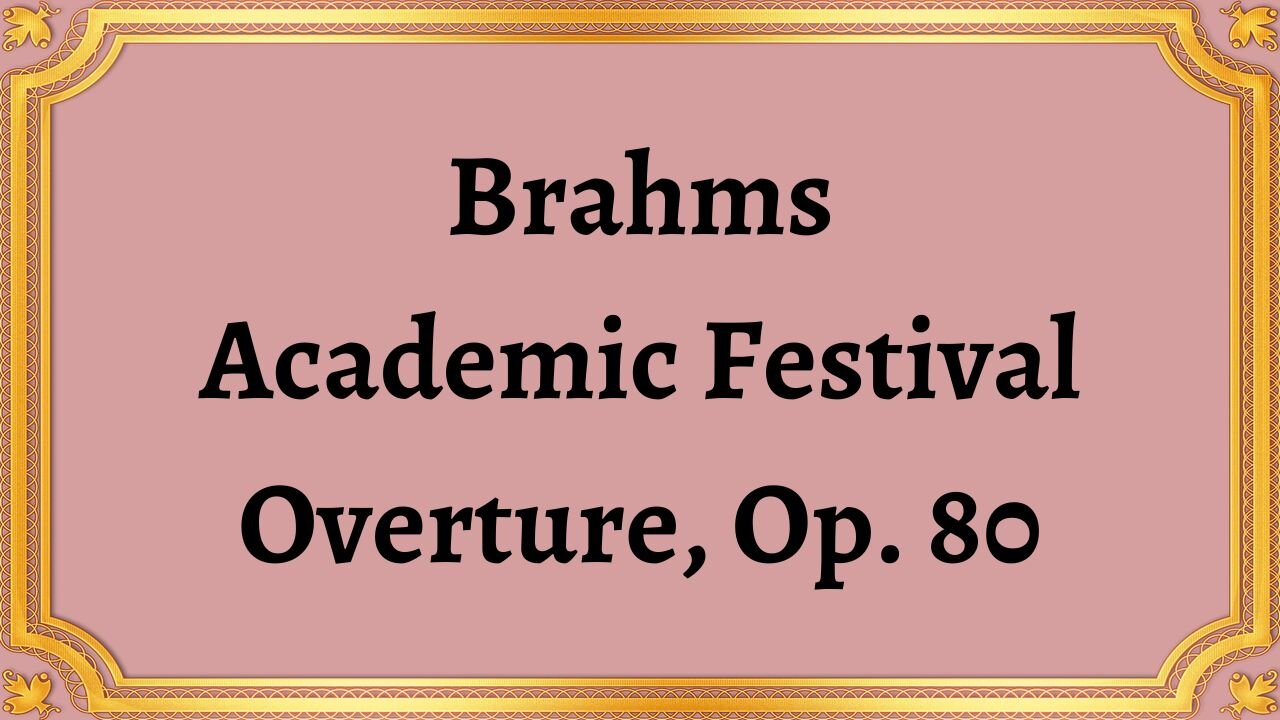Premium Only Content

Brahms Academic Festival Overture, Op. 80
#Brahms #classical_music#overture
The Brahms Academic Festival Overture, Op. 80 is a magnificent composition created by German composer Johannes Brahms in 1880. It is a brilliant piece of music that is often performed at academic ceremonies, graduations, and other formal events.
Brahms wrote this piece as a tribute to the academic community, specifically to the University of Breslau, where he received an honorary doctorate. The overture is based on a combination of academic songs, which were popular in German universities at the time, and traditional classical music. Brahms' intention was to create a sense of irony by using the festive and light-hearted academic songs into a serious classical form.
The Brahms Academic Festival Overture, Op. 80 opens with a powerful and bombastic fanfare, immediately capturing the listener's attention. It then transitions into a lively and dance-like section, built around the famous German academic song, "Wir hatten gebauet ein stattliches Haus." This section is full of energy and joy, and its cheerful melody is sure to uplift the audience's spirits.
As the piece progresses, it takes on a more serious tone, with grand orchestral sections that are reminiscent of the compositions of Beethoven. This transition reflects Brahms' intention of using the academic songs in a traditional classical form as a way of acknowledging the value of both forms in society.
The Brahms Academic Festival Overture, Op. 80 is known for its orchestrational complexity and emotional depth. The piece invokes a strong sense of grandeur and celebration, evoking images of academic achievement and the importance of education.
Overall, the Brahms Academic Festival Overture, Op. 80 has become one of the most popular classical compositions in the world, largely due to its ability to capture the audience's attention and convey a sense of celebration and grandeur. Its unique combination of traditional classical music and academic songs create a powerful sense of irony and appreciation for both forms, making it an ideal piece to commemorate academic achievement.
You have the opportunity to support the channel https://destream.net/live/RadSiarAl/donate
-
 51:42
51:42
Man in America
15 hours agoTrump, Elon, CBDCs, Digital Prison & the Great Taking w/ James Patrick
92.4K43 -
 3:50:14
3:50:14
I_Came_With_Fire_Podcast
14 hours agoSPECIAL LIVE FIRE (w/ Aaron Praeger)
88.5K19 -
 49:18
49:18
PMG
1 day ago $6.17 earned"Biden Regime Trying to Trigger WW III Before Trump Term Begins, and Ballots Still Being Counted?"
56K4 -
 1:24:27
1:24:27
Flyover Conservatives
20 hours agoWhile Trump Claimed Victory, Guess What They Were Doing Behind the Scenes... - Mel K | FOC Show
62.6K5 -
 1:33:53
1:33:53
Adam Does Movies
14 hours ago $5.55 earnedIs Dwayne Johnson A Bankable Star Anymore? + TONS Of New Movie Trailers - LIVE!
45.9K7 -
 3:00:44
3:00:44
Tate Speech by Andrew Tate
23 hours agoEMERGENCY MEETING EPISODE 91 - CASE DISMISSED
438K401 -
 2:22:54
2:22:54
WeAreChange
13 hours agoLiberal Media COLLAPSING! Begging For Forgiveness!
95K44 -
 17:25
17:25
TimcastIRL
21 hours agoDOJ, FBI Officials Are LAWYERING UP, FEARING Prosecutions From Matt Gaetz & Trump
87.4K211 -
 58:58
58:58
The StoneZONE with Roger Stone
14 hours agoAmerica’s Political Realignment – Democrat Gov. Rod Blagojevich Joins The StoneZONE w/ Roger Stone
52.6K6 -
 13:50
13:50
Tundra Tactical
14 hours ago $2.78 earnedILLINOIS Assault Weapon Ban OVERTURNED!!! (for now)
37K3